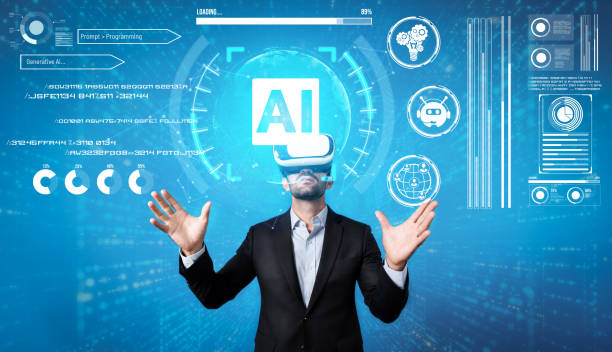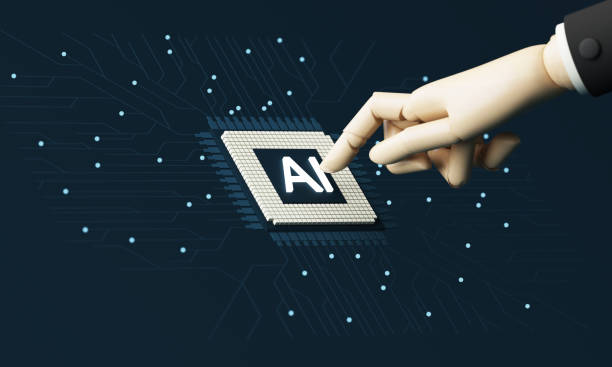What is Artificial Intelligence and How Does It Work?
Artificial Intelligence (#AI) is a branch of computer science that deals with building machines capable of performing tasks that typically require human intelligence.
These tasks include learning, problem-solving, pattern recognition, reasoning, and natural language understanding.
In other words, the goal of AI is to create systems that can think, decide, and act independently.
Artificial intelligence is built on complex algorithms and mathematical models.
These algorithms allow machines to learn from data, identify patterns, and make predictions.
The learning process in AI is usually done in two ways: Supervised Learning and Unsupervised Learning.
In supervised learning, the machine is trained using labeled data, while in unsupervised learning, the machine discovers patterns in the data without any labels.
Artificial Intelligence is rapidly advancing and is used in various fields, including medicine, finance, manufacturing, transportation, and entertainment.
However, the development of Artificial Intelligence also poses challenges, including ethical issues, security concerns, and its impact on the job market.
As a result, the responsible development and use of Artificial Intelligence is essential to benefit from its advantages and prevent its potential dangers.
For further reading, you can visit the Artificial Intelligence on Wikipedia page.
Are you annoyed by losing customers who visit your site to make a purchase?
Rasaweb is your specialized solution for having a successful online store.
✅ Significantly increase your online sales
✅ Create trust and professional branding with customers⚡ Get free consultation from Rasaweb experts!
Main Types of Artificial Intelligence
Artificial intelligence can be generally divided into two main categories: Weak AI (Narrow AI) and Strong AI (General AI).
Weak AI is designed to perform specific tasks and performs very well in the same area.
Examples of weak AI include facial recognition systems, voice assistants such as Siri and Alexa, and movie or music recommendation systems.
These systems are very skilled at their tasks, but cannot operate outside of these tasks.
Click here to preview your posts with PRO themes ››
Strong AI, sometimes referred to as Artificial General Intelligence (AGI), is a type of artificial intelligence that is capable of understanding, learning, and applying knowledge across a wide range of tasks, just like a human.
Strong AI is still in the early stages of development and so far no strong AI system has been fully created.
However, extensive research is underway to achieve this goal.
In addition to these two main categories, artificial intelligence can also be categorized based on learning methods.
Machine Learning is one of the most important sub-branches of artificial intelligence that allows machines to learn from data without explicit programming.
Deep Learning is also a sub-branch of machine learning that uses deep neural networks to analyze data and extract patterns.
Progress in each of these areas accelerates the development and application of artificial intelligence in various industries and helps create smarter and more efficient systems.
Applications of Artificial Intelligence in Various Industries
Artificial Intelligence is widely used in various industries and has had a significant impact on how these industries operate and their productivity.
In the field of medicine, artificial intelligence is used for diagnosing diseases, developing new drugs, and providing personalized healthcare.
AI-based systems can analyze medical images with high accuracy and diagnose diseases in their early stages.
In the financial industry, artificial intelligence is used for fraud detection, risk management, providing investment advice, and improving customer service.
Artificial intelligence algorithms can identify suspicious patterns in financial transactions and prevent fraud.
Also, artificial intelligence-based chatbots can answer customer questions and provide 24/7 support services.
In the manufacturing industry, artificial intelligence is used to optimize production processes, reduce costs, and improve product quality.
Artificial intelligence-equipped robots can perform repetitive and dangerous tasks and reduce human errors.
Also, artificial intelligence-based predictive systems can predict potential problems in the production line and prevent breakdowns.
| Industry | Application of Artificial Intelligence |
|---|---|
| Medicine | Disease Diagnosis, Drug Development |
| Finance | Fraud Detection, Risk Management |
| Manufacturing | Process Optimization, Cost Reduction |
| Transportation | Self-Driving Cars, Route Optimization |
Finally, in the transportation industry, artificial intelligence is used to develop self-driving cars, optimize routes, and reduce traffic.
Self-driving cars equipped with sensors and artificial intelligence algorithms can drive without human intervention and increase transportation safety and efficiency.
These applications are just a part of the broad potential of artificial intelligence in various industries, and with technological advances, more new applications are expected to be discovered.
Advantages and Disadvantages of Artificial Intelligence
By providing countless possibilities and capabilities, artificial intelligence has brought many benefits to various societies and industries.
One of the most important advantages of artificial intelligence is increasing efficiency and productivity in performing tasks.
Artificial intelligence-based systems can perform repetitive and time-consuming tasks faster and more accurately than humans, which leads to reduced costs and increased production.
Also, artificial intelligence can assist humans in complex and sensitive decision-making.
Artificial intelligence algorithms can analyze massive amounts of data and identify hidden patterns and relationships, which allows managers and decision-makers to make better decisions.
In the field of medicine, artificial intelligence can assist doctors in diagnosing diseases and selecting appropriate treatment methods.
However, artificial intelligence also has disadvantages that should be considered.
One of the most important disadvantages of artificial intelligence is the loss of human jobs.
With the advancement of artificial intelligence and automation, many of the tasks that were previously performed by humans are now performed by machines, which can lead to an increase in unemployment rates.
For more information on the impact of artificial intelligence on the labor market, you can visit this link.
In addition, artificial intelligence can lead to increased social inequalities.
Access to artificial intelligence technologies is usually easier for wealthier individuals and organizations, which can lead to these individuals and organizations benefiting more from the advantages of artificial intelligence and increasing social inequalities.
Finally, ethical issues are also among the disadvantages of artificial intelligence.
Decisions made by artificial intelligence systems may be biased and lead to discrimination.
Also, the use of artificial intelligence in areas such as surveillance and control can violate people’s privacy.
Therefore, the responsible development and use of artificial intelligence is essential to benefit from its advantages and prevent its disadvantages.
Are you losing business opportunities because of an outdated website? With Rasaweb, solve the problem of not attracting potential customers through your website forever!
✅ Attract more high-quality leads
✅ Increase brand credibility in the eyes of customers
⚡ Get free corporate website design consultation
Ethical Challenges in the Development of Artificial Intelligence
The development of artificial intelligence is associated with several ethical challenges that require careful attention and examination.
One of the most important ethical challenges is the issue of bias in algorithms.
Artificial intelligence algorithms learn using training data, and if this data is biased, the algorithm will also be biased.
This bias can lead to discrimination in decision-making, especially in areas such as hiring, lending, and justice systems.
Another ethical challenge is the issue of transparency and explainability.
Many artificial intelligence algorithms, especially deep neural networks, act as black boxes, meaning that it is not easy to understand how they reached a particular decision.
This lack of transparency can reduce trust in artificial intelligence systems and make accountability difficult.
The issue of privacy is another important ethical challenge in the development of artificial intelligence.
Artificial intelligence systems require a lot of data to function, and collecting and using this data can violate people’s privacy.
Especially in areas such as surveillance and control, the use of artificial intelligence can lead to violations of people’s fundamental rights.
In addition, the issue of accountability is also a complex ethical challenge in the development of artificial intelligence.
When an artificial intelligence system makes a mistake, it is difficult to determine who is responsible.
Is the developer, the user, or the artificial intelligence system itself responsible? Answering these questions requires new legal and ethical frameworks.
To address these ethical challenges, developers, policymakers, and society as a whole need to work together.
Developers should strive to create fairer and more transparent algorithms, policymakers should enact laws and regulations that protect people’s privacy and ensure accountability, and society should become more aware of the ethical issues related to artificial intelligence.
The Future of Artificial Intelligence and Its Impact on Our Lives
The future of artificial intelligence is very bright and full of potential.
With technological advances, artificial intelligence is expected to increasingly permeate our lives and have significant impacts on how we work, live, and interact with each other.
In the field of work, artificial intelligence can lead to the automation of many tasks, which can increase productivity and reduce costs.
However, this can also lead to the loss of human jobs, so it is necessary to create appropriate training and support programs to help people adapt to these changes.
In the field of personal life, artificial intelligence can help improve the quality of life.
Intelligent systems can help us manage our health, assist us in performing daily tasks, and provide more fun and personalized experiences.
Self-driving cars can make transportation safer and more efficient, and smart homes can make life more comfortable and easier.
Artificial intelligence can also play an important role in solving global problems such as climate change, poverty, and diseases.
Intelligent systems can analyze climate data and provide solutions to reduce greenhouse gas emissions.
Artificial intelligence can help improve agricultural efficiency and reduce food waste, and can play a role in developing new drugs and improving healthcare.
However, it is necessary to pay attention to the ethical and social challenges related to the development of artificial intelligence as well.
We must ensure that artificial intelligence is developed and used fairly and responsibly, and we prevent its potential risks.
This requires cooperation between developers, policymakers, and society as a whole.
Ultimately, the future of artificial intelligence depends on the decisions we make today.
By developing and using artificial intelligence responsibly, we can create a brighter and more prosperous future for everyone.
Machine Learning and Its Role in Artificial Intelligence
Machine Learning, as one of the main sub-branches of Artificial Intelligence, plays a very important role in the development and advancement of this field.
Machine Learning enables machines to learn from data and identify patterns without explicit programming.
This learning process helps machines improve their ability to predict, make decisions, and solve problems.
There are different types of machine learning algorithms, each suitable for a specific type of problem.
Supervised Learning is one of the most common types of machine learning, in which the machine is trained using labeled data.
In this type of learning, the machine learns to establish a relationship between inputs and outputs and can predict the appropriate output for new inputs.
Unsupervised Learning is another type of machine learning in which the machine discovers patterns in data without any labels.
This type of learning is suitable for problems such as Clustering and Dimensionality Reduction.
Reinforcement Learning is also another type of machine learning in which the machine learns how to act in a specific environment by trial and error to earn more rewards.
Machine Learning is used in various fields including medicine, finance, marketing and manufacturing.
In the field of medicine, machine learning can help doctors diagnose diseases, predict treatment outcomes, and provide personalized healthcare.
In the field of finance, machine learning can help identify fraud, manage risk and provide investment advice.
In the field of marketing, machine learning can help companies identify target customers, provide personalized advertising and improve conversion rates.
In the field of manufacturing, machine learning can help optimize production processes, reduce costs and improve product quality.
| Type of Machine Learning | Applications |
|---|---|
| Supervised Learning | Prediction, Classification |
| Unsupervised Learning | Clustering, Dimensionality Reduction |
| Reinforcement Learning | Robotics, Games |
Machine learning is rapidly advancing and is expected to play an increasingly important role in artificial intelligence in the future.
With the development of new algorithms and increased access to data, machine learning can help solve more complex problems and provide innovative solutions.
Deep Learning and Neural Networks
Deep Learning is a subset of Machine Learning that uses Deep Neural Networks to analyze data and extract patterns.
Deep neural networks are composed of multiple layers of nodes (neurons) that are connected to each other and transmit information through these connections.
These layers allow the machine to identify more complex and abstract patterns in the data.
Deep Learning is widely used in areas such as image recognition, natural language processing, sound recognition and gamification.
In the field of image recognition, deep neural networks can recognize images with very high accuracy and identify objects, people and scenes.
In the field of natural language processing, deep neural networks can understand, translate and generate text.
In the field of sound recognition, deep neural networks can recognize sounds and recognize words and phrases.
In the field of gaming, deep neural networks can learn games and defeat human players.
One of the most important advantages of Deep Learning is that it can automatically extract important features from data.
In traditional machine learning methods, engineers must manually select and extract important features, which is a time-consuming and difficult process.
But in Deep Learning, deep neural networks can automatically extract important features from data, which makes the learning process faster and more efficient.
Deep Learning also comes with challenges.
One of the main challenges of Deep Learning is that it requires a lot of data.
Deep neural networks need huge amounts of data to train, and if enough data is not available, the performance of the networks may be poor.
Another challenge of Deep Learning is that it can be computationally expensive.
Training deep neural networks requires a lot of computing power, and this can be problematic for some organizations and individuals.
However, with technological advances, Deep Learning is expected to play a more important role in Artificial Intelligence.
With the development of new algorithms and increased access to data and computing power, Deep Learning can help solve more complex problems and provide innovative solutions.
Don’t have a corporate website yet and miss out on online opportunities? With professional corporate website design by Rasaweb,
✅ Double the credibility of your business
✅ Attract new customers
⚡ Free consultation for your corporate website!
Robotics and Artificial Intelligence – Collaboration for the Future
Robotics and Artificial Intelligence are two related fields that can help create smarter and more efficient systems by working together.
Robotics deals with the design, construction, operation and application of robots, while Artificial Intelligence deals with the development of systems that are capable of performing tasks that usually require human intelligence.
By combining these two fields, robots can be created that are capable of understanding their surroundings, learning from experience and performing complex tasks independently.
Artificial Intelligence plays an important role in improving the performance and capabilities of robots.
Artificial Intelligence algorithms enable robots to recognize images, understand sounds, process natural language and make informed decisions.
These capabilities enable robots to operate in complex and unpredictable environments and perform various tasks.
Robots equipped with Artificial Intelligence are used in various fields including industry, medicine, agriculture and services.
In industry, robots can perform repetitive and dangerous tasks and reduce human errors.
In medicine, robots can assist in surgeries, develop new drugs and improve healthcare.
In agriculture, robots can harvest crops, irrigate land and remove weeds.
In services, robots can assist customers, provide information and perform administrative tasks.
The future of Robotics and Artificial Intelligence is very bright.
With technological advances, robots are expected to become smarter, more efficient and more versatile.
Robots can play an increasingly important role in our lives and help solve complex problems.
However, it is necessary to pay attention to the ethical and social challenges related to the development of Robotics and Artificial Intelligence as well.
We must ensure that robots are developed and used fairly and responsibly, and we prevent its potential risks.
With the development of Artificial Intelligence and Robotics together, it can be expected that in the future we will witness intelligent automated systems that are capable of performing complex tasks and solving difficult problems without the need for human intervention.
This cooperation can help the progress of societies and improve the quality of life of individuals.
Will Artificial Intelligence Replace Humans?
The question of whether Artificial Intelligence will eventually replace humans is one of the most controversial topics in the field of Artificial Intelligence.
A definitive answer to this question is difficult, but a logical perspective can be reached by examining various aspects of the issue.
Currently, Artificial Intelligence performs very well in performing specific and repetitive tasks, but in areas such as creativity, critical thinking and emotional intelligence, it still cannot compete with humans.
Many experts believe that Artificial Intelligence will act more as a supporting tool for humans than a complete replacement.
Artificial Intelligence can help humans perform difficult and time-consuming tasks, enabling humans to focus on more creative and strategic tasks.
In this scenario, Artificial Intelligence and humans can achieve better results by working together.
However, some other experts are concerned that with the advancement of Artificial Intelligence, many human jobs will be lost.
Automation can eliminate many repetitive and routine tasks, and this can lead to an increase in unemployment rates.
To address this challenge, governments and organizations need to create appropriate training and support programs to help individuals adapt to changes in the labor market.
Also, it is necessary to pay attention to the ethical issues related to the replacement of humans by Artificial Intelligence as well.
If Artificial Intelligence makes decisions that affect the lives of humans, who will be responsible for these decisions? How can it be ensured that Artificial Intelligence acts fairly and without bias? These questions require careful consideration and the creation of appropriate legal and ethical frameworks.
Ultimately, the future of human replacement by Artificial Intelligence depends on how this technology is developed and used.
If Artificial Intelligence is developed responsibly and with consideration for human interests, it can help improve our lives.
But if Artificial Intelligence is developed irresponsibly, it can lead to serious problems.
FAQ
| Question | Answer |
|---|---|
| 1. What is Artificial Intelligence (AI)? | It is a branch of computer science that aims to create machines capable of simulating human intelligence and performing tasks that require human thinking, such as learning, problem-solving, and decision-making. |
| 2. What are the main types of Artificial Intelligence? | They can be classified into weak artificial intelligence (Narrow AI) that focuses on a specific task, general artificial intelligence (General AI) that possesses comprehensive human capabilities, and super artificial intelligence (Super AI) that surpasses human intelligence. |
| 3. Mention some common applications of artificial intelligence in our daily lives. | They include voice assistants (such as Siri and Alexa), recommendation systems (such as Netflix and Amazon), self-driving cars, facial recognition systems, and spam filters. |
| 4. What is the difference between Artificial Intelligence and Machine Learning? | Artificial intelligence is the broader concept of creating intelligent machines, while machine learning is a subset of artificial intelligence that focuses on enabling systems to learn from data without explicit programming. |
| 5. What is Deep Learning? | It is a subset of machine learning that uses multilayer artificial neural networks (deep neural networks) to process data and discover complex patterns, and is used in image and speech recognition. |
| 6. What are the most prominent benefits of Artificial Intelligence? | Improving efficiency and productivity, automating repetitive tasks, making better decisions based on massive data analysis, and developing solutions to complex problems in areas such as medicine and science. |
| 7. What are the main challenges facing the development and deployment of Artificial Intelligence? | They include the need for huge amounts of high-quality data, privacy and security issues, bias in data and algorithms, and high development and maintenance costs. |
| 8. Does Artificial Intelligence raise ethical or social concerns? | Yes, it raises concerns about privacy, algorithmic bias, job losses due to automation, responsibility for errors made by intelligent systems, and the need for a regulatory framework. |
| 9. How can Artificial Intelligence affect the future of the labor market? | It can lead to automation of some routine tasks, but it will also create new jobs that require advanced skills in developing, operating, and maintaining artificial intelligence systems. |
| 10. What are some modern or promising technologies in the field of Artificial Intelligence? | They include advanced natural language processing (NLP) (such as large language models like ChatGPT), computer vision, robotics, and generative artificial intelligence (Generative AI). |
And other services of Rasa Web Advertising Agency in the field of advertising
Intelligent Social Media: A creative platform to improve customer behavior analysis with accurate audience targeting.
Intelligent Custom Software: An exclusive service to grow customer behavior analysis based on exclusive programming.
Intelligent Marketing Automation: Professional optimization for online growth using Google Ads management.
Intelligent Digital Advertising: Designed for businesses looking to attract customers through Google Ads management.
Intelligent Link Building: A combination of creativity and technology to improve SEO ranking through an SEO-oriented content strategy.
And more than hundreds of other services in the field of internet advertising, advertising consulting and organizational solutions
Internet Advertising | Advertising Strategy | Advertorial
Resources
Artificial Intelligence and the Future of Iran
,What is Artificial Intelligence?
,Let’s Identify the Applications of Artificial Intelligence
,Artificial Intelligence Article
? Are you ready to transform your business in the digital world? Rasaweb Afarin, a leading digital marketing agency, provides innovative and targeted solutions for your growth and success by offering comprehensive services including exclusive website design, SEO, and content marketing. With us, have a powerful and influential presence in the online space and achieve your business goals.
📍 Tehran, Mirdamad Street, next to the Central Bank, South Kazerun Alley, Ramin Alley, No. 6














